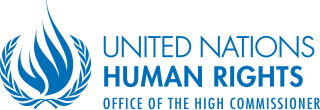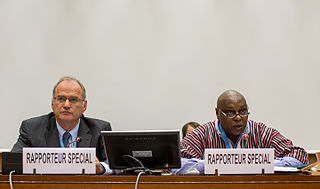
The Office of the United Nations High Commissioner for Human Rights (OHCHR) is a department of the United Nations Secretariat that works to promote and protect human rights that are guaranteed under international law and stipulated in the Universal Declaration of Human Rights of 1948. The office was established by the United Nations General Assembly on 20 December 1993 in the wake of the 1993 World Conference on Human Rights.

Special rapporteur is the title given to independent human rights experts whose expertise is called upon by the United Nations (UN) to report or advise on human rights from a thematic or country-specific perspective.

The human right to water and sanitation (HRWS) is a principle stating that clean drinking water and sanitation are a universal human right because of their high importance in sustaining every person's life. It was recognized as a human right by the United Nations General Assembly on 28 July 2010. The HRWS has been recognized in international law through human rights treaties, declarations and other standards. Some commentators have based an argument for the existence of a universal human right to water on grounds independent of the 2010 General Assembly resolution, such as Article 11.1 of the International Covenant on Economic, Social and Cultural Rights (ICESCR); among those commentators, those who accept the existence of international ius cogens and consider it to include the Covenant's provisions hold that such a right is a universally binding principle of international law. Other treaties that explicitly recognize the HRWS include the 1979 Convention on the Elimination of All Forms of Discrimination Against Women (CEDAW) and the 1989 Convention on the Rights of the Child (CRC).

Adama Dieng is a former UN Special Adviser on the Prevention of Genocide succeeded by Alice Wairimu Nderitu of Kenya. He is a former board member of the International Institute for Democracy and Electoral Assistance and a former registrar of the International Criminal Tribunal for Rwanda. He was designated an expert on human rights in Sudan on November 12, 2021, by the UN.

The Convention on the Rights of Persons with Disabilities is an international human rights treaty of the United Nations intended to protect the rights and dignity of persons with disabilities. Parties to the convention are required to promote, protect, and ensure the full enjoyment of human rights by persons with disabilities and ensure that persons with disabilities enjoy full equality under the law. The Convention serves as a major catalyst in the global disability rights movement enabling a shift from viewing persons with disabilities as objects of charity, medical treatment and social protection towards viewing them as full and equal members of society, with human rights. The convention was the first U.N. human rights treaty of the twenty-first century.

Human rights and climate change is a conceptual and legal framework under which international human rights and their relationship to global warming are studied, analyzed, and addressed. The framework has been employed by governments, United Nations organizations, intergovernmental and non-governmental organizations, human rights and environmental advocates, and academics to guide national and international policy on climate change under the United Nations Framework Convention on Climate Change (UNFCCC) and the core international human rights instruments. In 2022 Working Group II of the IPCC suggested that "climate justice comprises justice that links development and human rights to achieve a rights-based approach to addressing climate change".
The United Nations Independent Expert on the Promotion of a Democratic and Equitable International Order is a United Nations Independent Expert appointed by the United Nations Human Rights Council under its special procedures mechanism, to report on the thematic field of the promotion of a democratic and equitable international order. The mandate was established by Human Rights Council resolution 18/6, chiefly supported by developing countries.

David Kaye is an American politician who served as the United Nations special rapporteur on the Promotion and Protection of the Right to Freedom of Opinion and Expression between August 2014 and July 2020. He was succeeded by Irene Khan. Kaye is clinical professor of law at the University of California, Irvine on public international law, international humanitarian law human rights and international criminal justice. He is co-director of the UCI Fair Elections and Free Speech Center working at the intersection of technology, freedom of speech and democratic deliberation. He is also the independent board chair of the Global Network Initiative.
The proposed Convention on the Rights of Older Persons (UNCROP) is likely to be the next major human rights treaty adopted by the United Nations. The proposed treaty will seek to remedy the fragmented human rights structure for Older Persons, and will focus on reaffirming critical human rights which are of concern to older persons. The focus of the treaty will be persons over 60 years of age, which is a growing demographic worldwide due to increased population ageing. The treaty follows from the success of the United Nations Convention on the Rights of the Child which has seen near universal acceptance since 1989. Where the UNCRC focuses on the rights of younger persons, the UNCROP will address those who form the older portion of society, who according to United Nations reports, are becoming increasingly vulnerable as a group without applicable normative standards of human rights law. Support for a Convention is becoming increasingly popular, as human rights groups including the Committee on Economic, Social and Cultural Rights (CESCR), HelpAge International, the Committee on the Elimination of Discrimination against Women, the International Labour Organization, and many other NGOs and states have expressed support for a universal instrument. A raising number of NGOs from across the world have joined forces in advocating for a Convention in the Global Alliance for the Rights of Older Persons (GAROP) which has been set up out of the need to strengthen the rights of older persons worldwide. With population ageing, the human rights of the growing number of older persons have become an increasingly important issue. Among the human rights issues faced by older persons are ageist attitudes leading to discrimination, exclusion and constraints on the legal capacity, autonomy and independent living of older people. Existing human rights violations have been further exacerbated and put on the spotlight by the COVID-19 pandemic. Older people have been denied access to health services and became prone to physical and social isolation. The stigmatisation of older people and ageist images of older persons have also become more evident. The debate surrounding the convention focuses on the implementation and safeguarding of older persons’ human rights aiming to set normative standards of human rights for older persons in an international legally binding instrument. An underlying common factor and root cause of many of human rights violations experienced by older persons, along with its ubiquitous, prevalent, and surreptitious nature, is ageism. Ageism, as defined by the World Health Organization, refers to the stereotypes, prejudice and discrimination towards others or oneself based on age. A UNCROP would go a long way to tackle ageism. Individual relationships generally fall outside of current human rights law, which seeks to present standards of relations between states and individuals. Therefore, it has been suggested that the proposed human rights convention for older persons ought to be drafted as an anti-discrimination convention. However, this would not be consistent with other multilateral human rights conventions such as the ICCPR and ICESCR which set normative standards.
Euro-Mediterranean Human Rights Monitor is an independent, nonprofit organization for the protection of human rights.

Catalina Devandas Aguilar is a Costa Rican lawyer who served as the first United Nations Special Rapporteur on the Rights of Persons with Disabilities from 2014 until 2020. She currently serves as Permanent Representative of Costa Rica to the United Nations at Geneva. Previously, she worked for the World Bank and took part in the establishment of the Convention on the Rights of Persons with Disabilities with the United Nations Secretariat. She has spina bifida and uses a wheelchair.

Leilani Farha is a Canadian lawyer who is the Global Director of THE SHIFT, a housing initiative. Between June 2014 and April 2020, she was the United Nations special rapporteur on adequate housing.

Victor Madrigal-Borloz is a Costa Rican lawyer. Since 2018, he has served as the United Nations Independent Experton protection against violence and discrimination based on sexual orientation and gender identity . During his tenure at the U.N., Madrigal-Borloz has been noted for focusing his Human Rights Council mandate on investigating a broad and intersectional range of issues facing LGBT communities around the world, including conversion therapy, criminalization, socio-cultural exclusion, anti-trans rhetoric, and the outsized impact of the COVID-19 pandemic on vulnerable LGBT and gender-diverse populations.
The United Nations Independent Expert on protection against violence and discrimination based on sexual orientation and gender identity is a United Nations Independent Expert appointed by the body's Human Rights Council under its special procedures mechanism. The Independent Expert's Mandate is to examine, monitor, advise, and publicly report on matters related to human rights violations based on sexual orientation and gender identity.

Marcia Vaune Jocelyn Kran is a Canadian lawyer and expert member of the UN Human Rights Committee. Kran's career has spanned international human rights law, criminal law and political science for over forty years, and includes positions in academia and civil society. Kran has held a range of senior United Nations positions including in international human rights law.
Rosa Kornfeld-Matte is from Chile. She was the first United Nations Independent Expert on the enjoyment of all human rights by older persons, from May 2014 until May 2020.
Marie-Thérèse Bocoum, also known as Marie-Thérèse Keïta-Bocoum, is the United Nations Independent Expert on the situation of human rights in the Central African Republic. Educated in France and Côte d’Ivoire, she received the National Order of Côte d’Ivoire in 2014.
Siobhán Mullally is a United Kingdom-born Irish professor of law and the UN special rapporteur on human trafficking.
Muluka-Anne Miti-Drummond is a Zambian lawyer who became the United Nations Independent Expert on the "enjoyment of human rights by persons with albinism".
Alice Cruz is a Portuguese anthropologist who became a lawyer and the UN Special Rapporteur on the human rights of people with leprosy.











